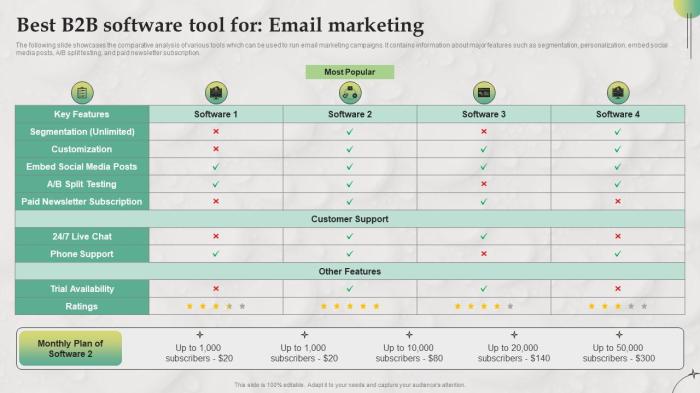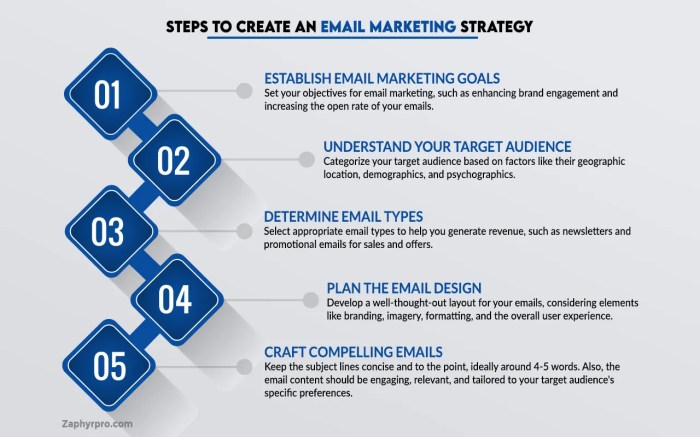
Embark on a journey through the world of B2B marketing software solutions, where innovation meets efficiency to propel businesses forward in the digital age. From market research to web design, discover how these tools can revolutionize your marketing strategies and boost your ROI.
Uncover the secrets behind successful B2B marketing campaigns and learn how to stay ahead of the competition with cutting-edge software solutions tailored for your business needs.
Market Research
Market research plays a crucial role in the development of effective B2B marketing software solutions. It helps businesses understand the needs and preferences of their target audience, identify market trends, and make informed decisions to drive their marketing strategies.
Importance of Market Research in B2B Marketing Software Solutions
Market research allows businesses to gather valuable insights into their target market, competitors, and industry landscape. By analyzing data and feedback, companies can tailor their software solutions to meet the specific needs of B2B clients, ultimately increasing customer satisfaction and retention.
- Identifying Key Pain Points: Market research helps businesses identify the key pain points and challenges faced by B2B customers. By understanding these pain points, companies can develop software solutions that address specific needs and provide value to their target audience.
- Competitor Analysis: By conducting market research, businesses can analyze their competitors’ strategies, strengths, and weaknesses. This information can be used to differentiate their software solutions, identify gaps in the market, and capitalize on opportunities for growth.
- Trend Analysis: Market research enables businesses to stay updated on the latest trends and developments in the B2B software industry. By monitoring industry trends, companies can adapt their marketing strategies, innovate their products, and stay ahead of the competition.
Methods and Tools for Conducting Market Research in the B2B Software Industry
In the B2B software industry, businesses use a variety of methods and tools to conduct market research effectively. These include:
- Surveys and Questionnaires: Businesses can gather feedback from B2B clients through surveys and questionnaires to understand their needs, preferences, and pain points.
- Interviews and Focus Groups: Conducting interviews and focus groups with B2B clients can provide valuable qualitative insights into their purchasing behavior and decision-making process.
- Data Analysis: Utilizing data analytics tools, businesses can analyze customer data, market trends, and competitor performance to inform their marketing strategies.
Benefits of Market Research for Staying Ahead of Competitors
Market research empowers businesses to stay ahead of competitors in the B2B software market by:
Identifying Emerging Trends: By monitoring market trends and customer preferences, businesses can anticipate changes in the industry and innovate their software solutions to meet evolving needs.
Understanding Customer Needs: Market research helps businesses understand the unique needs and expectations of B2B clients, enabling them to develop customized solutions that outperform competitors.
Enhancing Marketing Strategies: By leveraging market research insights, companies can optimize their marketing strategies, target the right audience, and communicate the value of their software solutions effectively.
Marketing Software
Marketing software solutions for B2B companies offer a wide range of key features and functionalities that help streamline marketing processes, enhance customer engagement, and ultimately drive revenue growth. These tools are designed to assist businesses in creating, executing, and analyzing their marketing campaigns more effectively.
Key Features and Functionalities
- Customer Relationship Management (CRM) Integration: B2B marketing software often integrates with CRM systems to provide a seamless flow of customer data and insights, allowing for more personalized and targeted marketing efforts.
- Marketing Automation: Automation features streamline repetitive marketing tasks, such as email campaigns, lead nurturing, and social media posting, saving time and resources.
- Analytics and Reporting: Advanced analytics tools track the performance of marketing campaigns, providing valuable insights into customer behavior, campaign effectiveness, and ROI.
- Lead Scoring and Segmentation: These features help prioritize leads based on their level of engagement and likelihood to convert, allowing for more targeted and personalized marketing strategies.
- Social Media Management: Marketing software solutions often include social media management tools to help businesses manage and analyze their social media presence across multiple platforms.
Comparison of B2B Marketing Software Solutions
| Software | Key Features | Pricing |
|---|---|---|
| HubSpot | CRM integration, marketing automation, analytics | Starting at $50/month |
| Marketo | Lead scoring, social media management, email marketing | Custom pricing |
| Pardot | Lead nurturing, ROI reporting, email automation | Starting at $1,250/month |
Benefits of Using Marketing Software for B2B Companies
- Improved Efficiency: Marketing software automates repetitive tasks, allowing marketers to focus on strategy and creativity.
- Enhanced Targeting: With advanced segmentation and analytics tools, B2B companies can target the right audience with personalized messages.
- Increased ROI: By tracking campaign performance and analyzing data, businesses can optimize their marketing efforts for better ROI.
- Better Collaboration: Marketing software facilitates collaboration between marketing, sales, and other teams, leading to more integrated and effective campaigns.
Streamlining Marketing Processes and Improving ROI
Marketing software can streamline marketing processes by automating tasks, improving targeting and personalization, and providing valuable insights through analytics. By optimizing campaigns based on data-driven decisions, B2B companies can improve ROI, drive revenue growth, and stay ahead of the competition.
Public Relations
Public relations play a crucial role in the B2B software industry by helping companies communicate effectively with their target audience, building credibility, and maintaining a positive brand image. Successful PR campaigns can enhance brand visibility, establish trust, and ultimately drive sales in the competitive B2B software market.
Role of Public Relations in B2B Software Industry
Public relations in the B2B software industry involves managing communication between companies and their various stakeholders, including customers, investors, media, and industry influencers. PR professionals use various strategies such as media relations, content creation, social media management, and event planning to shape public perception and promote the brand.
Examples of Successful PR Campaigns in B2B Software Companies
- Salesforce’s “Dreamforce” event is a prime example of a successful PR campaign that brings together industry professionals, thought leaders, and customers to showcase the latest innovations in cloud computing and CRM.
- HubSpot’s “Inbound Marketing Summit” is another well-known PR campaign that educates marketers on the latest trends and strategies in digital marketing, positioning the company as a thought leader in the industry.
Importance of Positive Brand Image in B2B Software Industry
Building and maintaining a positive brand image through PR strategies is essential for B2B software companies to differentiate themselves from competitors, attract new customers, and retain existing ones. A strong brand image can instill trust and confidence in the target audience, ultimately leading to increased sales and revenue.
Establishing Credibility and Trust through PR in B2B Software Companies
Public relations can help B2B software companies establish credibility and trust among their target audience by showcasing thought leadership, sharing customer success stories, and engaging with industry influencers. Through strategic PR initiatives, companies can position themselves as reliable partners, leading to long-term relationships with clients and stakeholders.
Marketing Sales

In the B2B software sector, marketing and sales are closely intertwined, working together to drive business growth and revenue. Marketing generates leads and creates brand awareness, while sales teams convert those leads into customers through personalized interactions and relationship-building.
Alignment through B2B Marketing Software Solutions
B2B marketing software solutions play a crucial role in aligning marketing and sales efforts. These tools provide valuable insights into customer behavior, preferences, and interactions, allowing both teams to collaborate effectively and tailor their strategies accordingly. By sharing data and analytics, marketing and sales teams can work towards a common goal of acquiring and retaining customers.
- B2B software companies often use customer relationship management (CRM) systems to track leads, manage sales pipelines, and nurture relationships with prospects.
- Marketing automation platforms help streamline marketing campaigns, lead scoring, and lead nurturing, ensuring that sales teams receive qualified leads that are more likely to convert.
- Account-based marketing (ABM) tools enable personalized outreach to key accounts, aligning marketing and sales efforts to target high-value customers effectively.
Importance of Collaboration for Business Growth
Collaboration between marketing and sales teams is essential for driving business growth in the B2B software sector. When both teams work together towards a shared goal, they can maximize their efforts, improve customer experience, and ultimately increase revenue. By aligning their strategies, sharing insights, and communicating effectively, marketing and sales teams can create a cohesive approach that delivers results.
Advertising and Telemarketing
In the competitive world of B2B marketing software solutions, advertising and telemarketing play crucial roles in reaching and engaging with potential clients. These strategies help companies promote their products and services, generate leads, and ultimately drive sales.
Role of Advertising in B2B Marketing
Advertising is essential for creating brand awareness and showcasing the unique features and benefits of B2B software solutions. Different advertising channels can be utilized to target specific audiences effectively. Some popular advertising channels for promoting B2B software solutions include:
- Online advertising through platforms like Google Ads, LinkedIn Ads, and industry-specific websites.
- Print advertising in industry publications and trade journals.
- Event sponsorships and partnerships to reach a targeted audience.
Tips for Successful Ad Campaigns Targeting B2B Audiences
To create successful ad campaigns targeting B2B audiences, consider the following tips:
- Understand your target audience and tailor your messaging accordingly.
- Focus on highlighting the value proposition and benefits of your software solutions.
- Utilize data-driven insights to optimize ad performance and reach the right audience.
- A/B test different ad creatives, messages, and channels to identify what works best.
Telemarketing in the B2B Software Industry
Telemarketing involves direct communication with potential clients via phone calls to generate leads and establish relationships. While telemarketing can be an effective strategy in the B2B software industry, it also comes with its own set of challenges. Some benefits and challenges of telemarketing in the B2B software industry include:
| Benefits: | Challenges: |
| – Personalized communication with prospects. | – Dealing with gatekeepers and call screening. |
| – Immediate feedback and opportunity for direct engagement. | – Compliance with regulations like GDPR and DNC. |
| – Ability to address objections and provide detailed information. | – Time-consuming nature of making multiple calls to reach decision-makers. |
Web Design and Development
Web design plays a crucial role in promoting B2B software solutions by creating a visually appealing and user-friendly platform that showcases the software’s features and benefits. A well-designed website can help build credibility, establish brand identity, and attract potential clients looking for reliable software solutions.
Best Practices for Designing B2B Software Websites
- Focus on simplicity and clarity to communicate key information effectively.
- Use high-quality images and visuals to enhance the overall look and feel of the website.
- Ensure easy navigation and intuitive user experience to keep visitors engaged.
- Optimize the website for mobile responsiveness to reach a wider audience.
Examples of Well-Designed B2B Software Websites
- HubSpot: Known for its clean design and easy-to-navigate layout, HubSpot’s website effectively showcases its marketing software solutions.
- Salesforce: Salesforce’s website features a professional design with interactive elements that engage visitors and highlight their CRM software.
Optimizing Web Development Processes for B2B Software Companies
- Collaborate closely with the marketing team to align website design with overall branding and messaging strategies.
- Regularly update content and features to reflect the latest software enhancements and industry trends.
- Implement best practices to improve search engine rankings and drive organic traffic to the website.
- Utilize analytics tools to track user behavior and make data-driven decisions for continuous improvement.
Making Money Online

In today’s digital age, B2B software companies have a plethora of opportunities to generate revenue through online channels. Let’s explore some effective monetization strategies and models that can help B2B companies increase their online revenue streams.
Subscription-Based Models
- Offering subscription-based services where customers pay a recurring fee for access to the software.
- Implementing tiered pricing plans with different features and functionalities at varying price points.
- Providing annual subscription options with discounts for long-term commitments.
Freemium Model
- Offering a basic version of the software for free to attract users and upsell them to premium features.
- Monetizing through in-app purchases, upgrades, or additional services beyond the free version.
- Using the freemium model to build a larger user base and convert free users into paying customers.
Value-Based Pricing
- Setting prices based on the value the software delivers to the customer, rather than the cost to produce it.
- Aligning pricing with the specific benefits and ROI that the software provides to the customer.
- Utilizing value-based pricing to capture more revenue from customers who derive significant value from the software.
End of Discussion
In conclusion, B2B marketing software solutions offer a strategic advantage to companies looking to enhance their marketing efforts, align sales and marketing teams, and establish a strong online presence. By leveraging these tools effectively, businesses can unlock new opportunities for growth and success in the ever-evolving digital landscape.
Essential FAQs
How can market research benefit B2B marketing software solutions?
Market research helps in understanding customer needs, analyzing competitor strategies, and identifying market trends, enabling businesses to tailor their marketing software solutions effectively.
What are the key features of B2B marketing software solutions?
Key features include lead generation, CRM integration, analytics, email marketing, and automation tools to streamline marketing processes and drive business growth.
How does public relations contribute to the success of B2B software companies?
Public relations helps in building brand reputation, establishing credibility, and fostering trust among target audiences, ultimately driving customer engagement and loyalty.
What is the significance of web design in promoting B2B software solutions?
Web design plays a crucial role in creating a visually appealing and user-friendly interface that attracts potential clients, enhances brand visibility, and improves overall user experience.
How can B2B companies generate revenue through online channels?
B2B companies can monetize their products and services by offering subscription-based models, implementing e-commerce platforms, providing premium features, and leveraging online advertising and affiliate marketing strategies.






